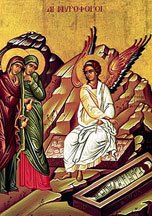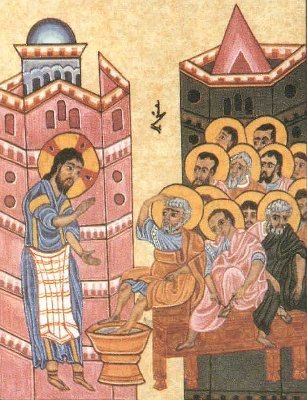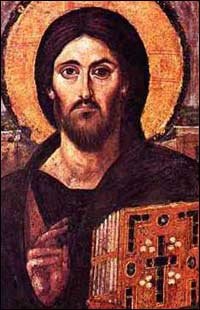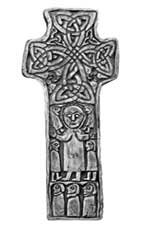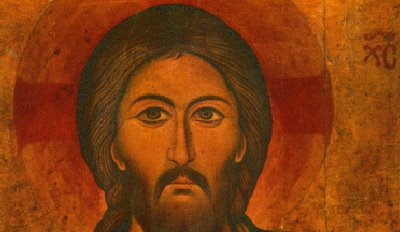Christ Is Risen!: Easter Morning
Below is the Easter Sermon of St. John Chrysostom. He lived three hundred years after Christ and was one of the key Christian leaders of his time. He is also considered one of the greatest preachers of all time. So much so that he earned the name Chrysostom which means "Golden Mouth".
This sermon is read, in it's entirety, every Easter in the Orthodox Church. It is brief and to the point. But its brevity does not take away from its meaningfulness. This sermon is a good place to begin our celebration of the resurrection of Christ.
The Easter Sermon of Saint John Chrysostom
Whosoever is a devout lover of God, let him enjoy this beautiful bright Festival. And whosoever is a grateful servant, let him rejoice and enter into the joy of his Lord. And if any be weary with fasting, let him now receive his penny.
If any have toiled from the first hour, let him receive his due reward. If any have come after the third hour, let him with gratitude join the Feast. And he that arrived after the sixth hour, let him not doubt; for he too shall sustain no loss. And if any have delayed to the ninth hour, let him not be afraid by reason of his delay; for the Lord is gracious and receives the last even as the first. He gives rest to him that comes at the eleventh hour as well as to him that toiled from the first.
Yea, to this one he gives, and upon that one he bestows. He accepts works, as He greets the endeavor. The deed he honors and the intention he commands.
Let all then enter into the joy of our Lord. You first and last receiving alike your reward; you rich and poor, rejoice together. You sober and you slothful, celebrate the day. You that have kept the fast, and you that have not, rejoice today for the Table is richly laden. Fare royally on it. The calf is a fatted one. Let no one go away hungry. Partake you all of the cup of faith. Enjoy you all the riches of His goodness. Let no one grieve at his poverty; for the universal Kingdom has been revealed.
Let no one mourn that he has fallen again and again; for forgiveness has risen from the grave. Let no one fear death, for the Death of our Saviour has set us free. He has destroyed it by endruing it. he spoiled Hades when he descended thereto. He vexed it even as it tasted of His flesh. Isaiah foretold this when he cried, "Thou, O Hades, Has been vexed by encountering Him below."
It is vexed; for it is even done away with. It is vexed; for it is made a mockery. it is vexed; for it is destroyed. It is vexed; for it is annihilated. It is vexed; for it is now made captive. It took a body, and it discovered God. It took earth, and encountered Heaven. It took what it saw and was overcome by what it did not see.
"O death, where is thy sting? O Hades, where is thy victory?" Christ is risen, and thou art annihalated. Christ is risen, and the evil ones are cast down. Christ is risen, and the Angels rejoice. Christ is risen, and life is libertaed. Christ is risen, and the tomb is emptied of the dead; for Christ having risen from the dead, is become the first fruits of those who have fallen asleep. to Him be glory and power forever and ever. Amen.
Christ is risen, indeed.
This sermon is read, in it's entirety, every Easter in the Orthodox Church. It is brief and to the point. But its brevity does not take away from its meaningfulness. This sermon is a good place to begin our celebration of the resurrection of Christ.
The Easter Sermon of Saint John Chrysostom
Whosoever is a devout lover of God, let him enjoy this beautiful bright Festival. And whosoever is a grateful servant, let him rejoice and enter into the joy of his Lord. And if any be weary with fasting, let him now receive his penny.
If any have toiled from the first hour, let him receive his due reward. If any have come after the third hour, let him with gratitude join the Feast. And he that arrived after the sixth hour, let him not doubt; for he too shall sustain no loss. And if any have delayed to the ninth hour, let him not be afraid by reason of his delay; for the Lord is gracious and receives the last even as the first. He gives rest to him that comes at the eleventh hour as well as to him that toiled from the first.
Yea, to this one he gives, and upon that one he bestows. He accepts works, as He greets the endeavor. The deed he honors and the intention he commands.
Let all then enter into the joy of our Lord. You first and last receiving alike your reward; you rich and poor, rejoice together. You sober and you slothful, celebrate the day. You that have kept the fast, and you that have not, rejoice today for the Table is richly laden. Fare royally on it. The calf is a fatted one. Let no one go away hungry. Partake you all of the cup of faith. Enjoy you all the riches of His goodness. Let no one grieve at his poverty; for the universal Kingdom has been revealed.
Let no one mourn that he has fallen again and again; for forgiveness has risen from the grave. Let no one fear death, for the Death of our Saviour has set us free. He has destroyed it by endruing it. he spoiled Hades when he descended thereto. He vexed it even as it tasted of His flesh. Isaiah foretold this when he cried, "Thou, O Hades, Has been vexed by encountering Him below."
It is vexed; for it is even done away with. It is vexed; for it is made a mockery. it is vexed; for it is destroyed. It is vexed; for it is annihilated. It is vexed; for it is now made captive. It took a body, and it discovered God. It took earth, and encountered Heaven. It took what it saw and was overcome by what it did not see.
"O death, where is thy sting? O Hades, where is thy victory?" Christ is risen, and thou art annihalated. Christ is risen, and the evil ones are cast down. Christ is risen, and the Angels rejoice. Christ is risen, and life is libertaed. Christ is risen, and the tomb is emptied of the dead; for Christ having risen from the dead, is become the first fruits of those who have fallen asleep. to Him be glory and power forever and ever. Amen.
Christ is risen, indeed.
